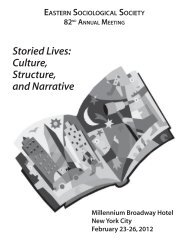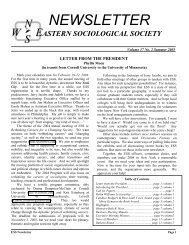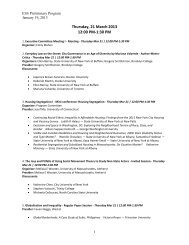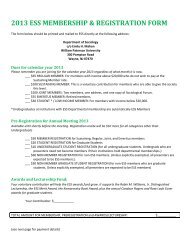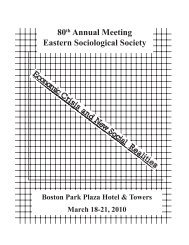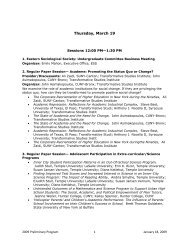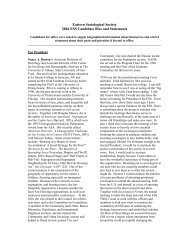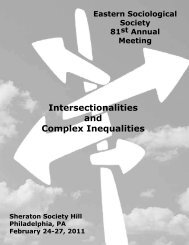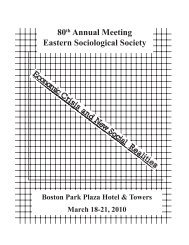Candidate Bios - Eastern Sociological Society
Candidate Bios - Eastern Sociological Society
Candidate Bios - Eastern Sociological Society
Create successful ePaper yourself
Turn your PDF publications into a flip-book with our unique Google optimized e-Paper software.
to run for office has a special personal meaning tome. My mother, Anne Foner, was vice-president ofthe ESS in the late 1980s, so being involved in theESS, one might say, is something of a familytradition.What would be my goals if I were to be elected?Above all, I would aim to continue the excellentwork of recent presidents. I would work hard tosupport, promote, and sustain our outstandingjournal, <strong>Sociological</strong> Forum, and the annual meeting,which are at the very heart of the ESS. The annualmeeting is a place for sharing and generating newresearch and ideas among established scholars as wellas those in earlier stages of their careers. A greatstrength is its welcoming environment for graduatestudents and junior faculty who have an opportunityto present their work, have conversations with moresenior sociologists, and expand their networks in thediscipline. It has been wonderful to see my ownstudents presenting papers at the ESS annual meetingand making connections there that have, in somecases, led to new collaborations and projects.Just as important as welcoming graduate students,junior faculty, and independent scholars to the annualmeeting is the need to continue to encourageprominent sociologists to participate throughthematic and other special sessions and the highlysuccessfulmini-conferences that have become astaple in recent years.I would also seek to strengthen and increase ourinternational outreach, especially through invitationsto sociology colleagues in Western Europe toparticipate in the annual meeting. Among otherthings, they can bring a trans-Atlantic comparativeperspective to a range of issues of concern in thiscountry, from immigration and ethnoracial diversityto questions of gender inequality and classstratification and mobility. It would also be fruitful toencourage interdisciplinary discussions in specialsessions--bringing sociologists into dialogue withleading historians, political scientists, geographers,and other social scientists as a way to highlight thedistinctive contributions of sociological approachesto particular theoretical and empirical questions andreflect on what we can learn from other fields.The ESS has long been a place for discussion ofcentral policy issues in American society, and thereare many pressing concerns now on the table.Income inequality has grown to outsize proportions,for example, racial inequalities are still ever present,and health-care needs are rising as an agingpopulation of baby boomers faces an uncertainfuture. The ESS provides an important forum forsociologists to share research that analyzes these andother policy questions.In the end, it is the emphasis on serious and highquality scholarship, the openness to differenttheoretical and methodological approaches, and thewelcoming of scholars from a range of backgrounds,institutions, and career stages that are majorhallmarks of the ESS. These are all traditions that Iam deeply committed to preserving and indeedstrengthening.* * * * * *Rhonda F. Levine (Ph.D SUNY-Binghamton) isProfessor of Sociology at Colgate University, whereshe has been teaching since 1982. Prior to joining thefaculty at Colgate, Rhonda taught at BowdoinCollege and Hobart and William Smith Colleges. AtColgate, she has served as Chair of the Sociology andAnthropology Department, was the inauguratingholder of the Arnold A. Sio Chair in Diversity andCommunity, and is currently completing her term ascoordinator of African American Studies. She isauthor of Class Struggle and the New Deal:Industrial Labor, Industrial Capital, and the States(University of Kansas Press, 1988), Class, Networks,and Identity: Replanting Jewish Lives from NaziGermany to Rural New York (Rowman andLittlefield, 2001), editor of Social Class andStratification: Classic Statements and TheoreticalDebate (Rowman and Littlefield, 1998, 2 nd editionwith new introduction, conclusion, and chapters,2006), Enriching the <strong>Sociological</strong> Imagination: HowRadical Sociology Changed the Discipline, ed.(Paradigm Publishers, 2005) and co-editor ofRecapturing Marxism: An Appraisal of RecentTrends in <strong>Sociological</strong> Theory (Praeger, 1987),Bringing Class Back In: Contemporary andHistorical Perspectives (Westview Press, 1991), and,Radical Sociologists and the Movement: Experiences,Lessons, and Legacies (Temple University Press,1991). Rhonda has published articles in a number ofjournals and edited books, including SocialProblems, Research in Social Movements, Conflictsand Change, Current Perspectives in Social Theory,Research in Political Sociology, Critical Sociology,Paradigm Lost: State theory Reconsidered, ed.Aronowitz and Bratsis, Sociology Confronts theHolocaust: Memories and Identities in JewishDiaspora, ed. Gerson and Wolfe, Sociology of Sportand Social Theory, ed Smith, and Crisis, Politics andCritical Sociology, ed. Cassano and DelloBuono.Her forthcoming book, When Race Meets Class:African Americans Coming of Age in a Small City(Paradigm Publishers) is a ten year longitudinalethnographic account of the lives of low-incomeAfrican American teenagers and young adults in an2
integrated small city in the Northeast. Specifically, itis about how their lives unfold through theintersection of human agency and the social andcultural milieu in which they live. Focusing on theirhigh school years but continuing through youngadulthood, this book explores how their interactionand experience with multiple social institutions(family, school, community) and individuals (parents,friends, teachers, coaches, strangers) shape theirhopes, fears, aspirations, and worldviews. In turn,the intersectionality of their social identities–howrace, class, gender come together to influence howthey come to think about who they are–influencesmany behaviors that directly contradict their statedaspirations. Coupled with limited access toresources, this intersectional conceptualization of selfoften takes these youths on a path profoundlydifferent than their stated values and life goals. Byfollowing the same youths and young adults over thecourse of their high school years and five years after,critical junctures and turning points shaping lifetrajectories as they unfold in real time are uncovered,at the same time challenging common explanationsfor the educational and occupational barriers facingAfrican American youth and young adults.Rhonda has served on the editorial boards of<strong>Sociological</strong> Forum, Social Problems, CriticalSociology, Research in Political Sociology, and thebook series, <strong>Sociological</strong> Perspectives in Social Life(Westview Press). She has also served on numerouscommittees and has held elected office in a numberof professional organizations. Rhonda has served theESS as member and chair of the Candace RogersAward Committee, member of the PapersCommittee, Committee on Membership, and thePublications Committee and elected to the ExecutiveCommittee. Rhonda also served for five years on theEditorial Board of ESS’s flagship journal<strong>Sociological</strong> Forum. Rhonda has served on variouscommittees of the <strong>Society</strong> for the Study of Socialproblems (SSSP), including member and chair of theHarry Braverman Award Committee, Chair of theProgram Committee, and was elected to the Board ofDirectors. In the American <strong>Sociological</strong> Association(ASA), Rhonda has been elected to various positions(council, chair, secretary-treasurer) in a number ofASA Sections and has served on ASA committees,including Committee on Sections (also chair),Committee on Freedom of Research and Teaching,Committee on Committees, Task Force on HumanRights, Task Force on Contingent Employment in theAcademic Workplace, Fund for the Advancement ofthe Discipline, and the 2012 Program Committee.She also has held elected positions as member ofCommittee on Nominations and ASA Council.Statement:I am greatly honored to be asked to run for thePresidency of the <strong>Eastern</strong> <strong>Sociological</strong> <strong>Society</strong>. I stillremember clearly presenting a paper at an annualESS meeting as a graduate student and how much inawe I was of meeting well-known sociologists andthrilled when they would ask me questions andappear to be actually interested in my research. Itwas not only well-known sociologists who wereimportant for my own sociological development, butalso the larger ESS membership -- my peers, when Iwas a graduate student and young assistant professor,and sociologists in all kinds of research, teaching,and applied settings. So many of those earlyrelationships have been sustained over the past 30+years. For me, as I am sure for many others, ESS,especially the annual meeting, was my introductionto the profession and provided me with a solidprofessional foundation from which to build. One ofthe special qualities of the ESS is that it not onlyprovides a forum for intellectual exchange, but that itplays such an important role in the professionalsocialization of graduate students and young scholars.One of the many strengths of ESS is the diversity ofour membership, not only in terms ofrace/ethnicity/gender/sexual preference, but also interms of institutional setting, whether it be researchbaseduniversities, four-year liberal arts institutions,two-year colleges, or applied and research settings.If elected, I will continue what the ESS leadershiphas been building over the past years -- anintellectually relevant and vibrant association. Thismeans assuring that our flagship journal, <strong>Sociological</strong>Forum, receives all the support necessary to maintainits high standing in the discipline and to do all we canto assure that we receive an ample number of firstratearticles to review. It is safe to say that of all theregional associations, ESS has the best annualmeetings. Our sessions with well-knownsociologists, our mini-conferences, our author-meetscriticssessions, and of course our sessions made upof submitted papers from our membership at large,are engaging, thought-provoking, and best of all,inclusive to all kinds of sociologists. I will continueto build our membership and work to expandparticipation by people from all types of educationaland institutional settings in the annual meeting. Iwould like to see even more active participation bysenior scholars who would engage with juniorscholars, and to continue reaching out to graduatestudents and expanding undergraduate involvementas well.Most recently, my participation on the 2012 ASAProgram Committee gives me a great appreciation ofwhat it takes to create successful meetings. First and3
foremost is a good working relationship with ourExecutive Office. Second is to be open to diversevoices in order to assure that our meetings areinclusive and relevant to all segments of ourmembership. Finally, encourage alternative waysthat discussions which begin in sessions can continuewell after our meetings have ended.My extensive and diverse networks allow me to tapinto our broad membership. I will work towardcapturing innovative ideas and help translate theminto research and teaching programs andorganizational initiatives that benefit ESS, ourmembership, and the discipline overall.I believe that ESS will be able to advance thediscipline and the profession if we continue toactively reflect and promote our diversity as scholars,teachers, and practitioners. I would be gratified to bepart of this process.* * * * * *For Vice President:Nazli Kibria is Professor of Sociology at BostonUniversity. She has served as a member of the ESSExecutive Committee (2010-2013) and also of the2010 Program Organizing Committee for the 2010ESS Annual Meeting. She was Co-Chair of the2011-2012 Mirra Komarovsky Book AwardSelection Committee. She has been a member of theEditorial Boards of Contemporary Sociology, Ethnicand Racial Studies, Identities, Journal of AsianAmerican Studies, Journal of Marriage and theFamily, and South Asian Diaspora.Kibria received her B.A. from Wellesley Collegeand her M.A. and Ph.D. from the University ofPennsylvania. Much of her research focuses on thesocial and political dynamics of immigration,particularly in relation to families and communities.She has also written on childhood, gender, anddevelopment issues with a focus on South Asia.Her first book, titled Family Tightrope: TheChanging Lives of Vietnamese Americans (PrincetonUniversity Press, 1993), received honorable mentionfor the William Goode Book Award of the ASASociology of Family section. The book drew onethnographic fieldwork to explore the complexity ofhousehold economic strategies within a communityof newly settled Vietnamese American families, andthe consequences of these strategies for gender andgenerational relations.In her second book called Becoming AsianAmerican: Identities of Second-Generation Chineseand Korean Americans, Kibria turns to questions ofrace and identity in the immigrant experience. With afocus on the experiences of the adult children ofChinese and Korean immigrants to the US, sheconsiders questions of race and assimilation amongpost-1965 immigrants to the US, specifically amongAsian Americans. She reports the emergence amongsecond-generation Chinese and Korean Americans ofa new kind of pan--Asian American identity, one thatcomplements the Chinese or Korean Americanidentity rather than replacing it.Kibria’s most recent book is called Muslims inMotion: Islam and National Identity in theBangladeshi Diaspora. The study offers acomparative look at Bangladeshi Muslims indifferent global contexts-including Britain, the U.S.,the Middle East, and Malaysia. Drawing on morethan 200 in-depth interviews, Kibria examinesinternational migrant flows from Bangladesh, andconsiders how such migrations continue to shapeIslamization in these areas. She also focuses on thecomplex significance of nationality--with richanalyses of the diaspora, the role of gender and class,and the multiple identities of the migrants, she showshow nationality can be both a critical source ofsupport and also of difficulty for many in their effortsto attain lives of dignity.Kibria‘s contributions have appeared in AmerasiaJournal, Culture and Religion, Ethnicities, Ethnic andRacial Studies, Gender & <strong>Society</strong>, InternationalJournal of Sociology of the Family, Journal ofComparative Family Studies, Journal ofDevelopmental Entrepreneurship, Social Problems,<strong>Sociological</strong> Perspectives and a number of editedbooks. She is currently writing a book on race andimmigration in the contemporary US.Statement:I am greatly honored to be nominated for the positionof Vice President of the <strong>Eastern</strong> <strong>Sociological</strong> <strong>Society</strong>.I remember the first academic paper I ever presentedto be as a graduate student at an ESS AnnualMeeting. Many years later, I continue to value theopenness of ESS to active participation from faculty,practitioners, graduate students, and evenundergraduates from a wide range of colleges,universities, and non-academic settings. As a memberof the ESS Executive Committee (since 2010), I havebeen delighted to see several highly successful annualmeetings, jam-packed with exciting panels, roundtablediscussions, author-meets critics sessions andmini-conferences. If elected, I look forward toworking with ESS members to ensure the continuedvitality of the annual meetings as well as the journal<strong>Sociological</strong> Forum. I am particularly interested increating forums and initiatives within ESS that wouldbring international issues and perspectives into focus.Having served as Graduate Program Director of the4
Sociology department at Boston University forseveral years, I would also like to see ESS expandits support for graduate students through mentorshipprograms and employment workshops.* * * * * * * * * * * * * * *Rebecca S.K. Li (Ph.D. 1998, UC Riverside) isAssociate Professor of Sociology at The College ofNew Jersey (Ewing, NJ). Professor Li employshistorical-comparative method to examine theinteractions between market dynamics and statedevelopment in China. She is currently working onher book entitled Globalization, Market, and StateDevelopment in China. In this book, she uses statebreakdown theories to first examine three cases ofrebellion and one case of revolution in Qing Chinaand finds that rapid commercial and marketdevelopment can be as destabilizing as rapidpopulation growth and geopolitical deterioration.Applying this theoretical framework to examinecontemporary China, she then argues that while rapidmarket development has brought about changes in theChinese state, it is not necessarily moving towarddemocracy. She has been invited to lead a graduateseminar based on her work at Goethe University inFrankfurt, Germany and to give lectures atuniversities in Hong Kong. She organized the firstmini-conference on China at the ESS in 2010.Professor Li’s work has been published in journalssuch as <strong>Sociological</strong> Theory and <strong>Sociological</strong>Inquiry. She served on the editorial board of<strong>Sociological</strong> Perspective, and has served as reviewerfor a number of refereed journals and Polity Press.Rebecca has been a member of the ESS since 1998and served on the program committee of the 2005annual meeting in Washington, D.C. She was electedto the ESS executive committee in 2008. During herthree year term, she chaired the Candace RogerStudent Paper Award committee, Rose Laub CoserDissertation Proposal Award committee, ESS MeritAward committee and served on the nominationcommittee and Robin M. Williams, Jr. Lectureshipsite selection committee. She also chaired theSociology and Anthropology Department at TheCollege of New Jersey from 2002-2005 during whichshe led the faculty through a curriculartransformation where all courses had to be redesignedand an assessment plan for the new curriculum had tobe designed and put in place while recruiting newfaculty to build two new specializations. Outside thedepartment, she has also chaired the Middle StateStudent Learning Assessment committee and thestrategic planning committee of the School of Cultureand <strong>Society</strong>, among others.Rebecca is a long-time member of the Pacific<strong>Sociological</strong> Association, having served on thestudents’ affairs committee and organized numerouspaper sessions in sociological theory andglobalization and professional workshops. She hasbeen invited to organize professional workshops atASA and nominated to serve as treasurer of theTheory Section.Statement:I am honored to be nominated to serve as VicePresident of ESS. My three years on the ESSexecutive committee (2008-2011) afforded metremendous opportunity to grow professionally as asociologist. I worked with three great presidents,Kathleen Gerson, Rosanna Hertz and Christine Bose,which allowed me to learn from them how they usedtheir past leadership experience and mobilized theirprofessional networks to organize successful annualmeetings and nurture the organization to fulfill its fullpotential. Every year I was on the executivecommittee, attendance at the annual meeting brokerecord. I witnessed how the presidents and vicepresidentsbuild on past success and identify ways tomake our annual meeting an even more attractivevenue for stimulating intellectual discussions anduseful opportunity for professional development forscholars at different stages of their career. ESSstrives to be a place where sociologists from differentkinds of institutions can feel at home to share theirresearch, contribute to the organization’s growth andbenefit from their participation. This vision is verydear to my heart and it is why I decided to accept thenomination so that I can, if elected, work witheveryone on the executive committee to ensure thatESS continues to be a welcoming place to allsociologists in the region.The future of our discipline relies a great deal on thehealth of its professional organizations. For theseorganizations, such as the ASA and ESS, to fulfilltheir functions well, having leaders who are able andwilling to take the organizations through thechallenges of our time is crucial. I believe regionalorganizations like the ESS can serve the discipline inthis regard as incubators of future leaders. I havebeen very fortunate to have the opportunity tocontribute to ESS as a member of the executivecommittee where I learned the work of running aprofessional organization and its annual meeting.The experience broadened my perspective and leftme with valuable leadership experience I can applyon campus and in professional organizations topromote the discipline of sociology. During mythree-year term, I chaired a number of awardcommittees and I saw these committees as importantways to bring young sociologists in the region into5
the ESS family. I always tried my best to recruitcommittee members from different kinds ofinstitutions to serve on these committees, with thebelief that the experience would encourage them toengage more actively in the ESS, and many did.Service on these committees provides sociologistsearly in their career opportunities to network withothers and learn the work of professionalorganizations. While the ESS benefits from theinsight and energy these young sociologists bring tothe committees, including them also serves theimportant purpose of training future leaders for theorganization. If elected, I will work with others onthe executive committee to identify ways to help theESS fulfill this function even more effectively.I strongly believe that regional associations like theESS have an important role to play in professionalsocialization of students. When I was in graduateschool in California, the Pacific <strong>Sociological</strong>Association served me very well in welcoming me tothe community of sociologists and socializing meinto a young scholar. The experience has inspired meto give back to the discipline in whatever way I can.That is why I continue to participate in PSAmeetings, giving paper presentations and workshopsto help graduate students and young scholars early intheir career, and served on the editorial board ofPSA’s official journal <strong>Sociological</strong> Perspective. Ifelected, I will work with the executive committee tofurther promote this function of the ESS for graduatestudents in the region.In addition to playing this important role in theprofessional socialization of graduate students andyoung scholars, the ESS is also uniquely positionedto have serious impacts on the discipline given thehigh concentration of fine sociology departments inthe region. Over the years, I have presented at theESS annual meeting every year and I found myselfengaging in intellectual discussions that are highlystimulating each and every time. If elected, I willwork with the executive committee to take advantageof the wealth of intellectual resources in the region tomake the annual meetings one of the mostintellectually stimulating events in sociology as wellas a welcoming home where fellow sociologists cometo share their work and life.* * * * * *For Executive Committee:Alondra Nelson is Associate Professor in theDepartment of Sociology at Columbia University.She also holds an appointment at the Institute forResearch on Women and Gender, where she is theDirector of Undergraduate Studies.Nelson's research explores the production ofknowledge about human difference in biomedicineand technoscience and the circulation of these ideasin the public sphere: Her research focuses on howscience and its applications shape the social world,including aspects of personal identification, racialformation and collective action. In turn, she alsoexplores the ways in which social groups challenge,engage and, in some instances, adopt and mobilizeconceptualizations of race, ethnicity, and genderderived from scientific and technical domains.Nelson is the author of Body and Soul: The BlackPanther Party and the Fight Against MedicalDiscrimination (University of Minnesota Press,2011), which received the Distinguished Contributionto Scholarship Book Award from the American<strong>Sociological</strong> Association (Section on Race, Gender,and Class); the Letitia Woods Brown Memorial BookAward from the Association of Black WomenHistorians; and the Association for HumanistSociology Book Award. Body and Soul is the firstbook-length exploration of the radical organization’shealth-focused activities. Through its activism,Nelson argues, the Black Panther Party advanced a“social health” frame—a distinctive, expansiveconceptualization of well-being that articulatedbiological wellness with both economic justice andracial equality and that would anticipatecontemporary debates about racial health disparities.Her next book, The Social Life of DNA: Race andReconciliation after the Genome (forthcoming fromBeacon Press), traces how claims about ancestry aremarshaled together with genetic analysis in a range ofsocial ventures. She takes up these themes in tworecent publications that are among the earliestempirical scholarly investigations of direct-toconsumergenetic testing: “Bio Science: GeneticAncestry Testing and the Pursuit of AfricanAncestry” (Social Studies of Science 38, 2008) and"The Factness of Diaspora: The Social Sources ofGenetic Genealogy" (in Revisiting Race in aGenomics Age, Rutgers University Press, 2008).Nelson is also co-editor of Genetics and theUnsettled Past: The Collision of DNA, Race, andHistory (with Keith Wailoo and Catherine Lee;Rutgers University Press, 2012) and Technicolor:Race, Technology, and Everyday Life (with ThuyLinh N. Tu; New York University Press, 2001).Nelson’s essays, reviews and commentary haveappeared in the New York Times, the WashingtonPost, the Boston Globe, Science, ScientificAmerican, the Chronicle of Higher Education,6
Dissent and the Guardian, among others venues. Herpublications also include articles on race and digitalculture; “scientism” in black power politics; the useof racial categories in medicine; and the socialimplications of direct-to-consumer genetic testing,genetic genealogy and social media.The Ford Foundation, the Woodrow WilsonFoundation and the Andrew W. Mellon Foundationhave supported her research. From 2006-2007, shewas an external fellow at the W.E.B Du Bois Institutefor African and African American Research atHarvard University. She has also been a visitingscholar at the International Center for AdvancedStudy at New York University, the BIOS Centre atthe London School of Economics, the Bavarian-American Academy in Munich, and the Max PlanckInstitute for the History of Science in Berlin. Prior tojoining Columbia University, Nelson was on thefaculty of Yale University, where she received thePoorvu Family Award for Interdisciplinary TeachingExcellence.Nelson received her B.A. in Anthropology (magnacum laude) from the University of California at SanDiego, where she was elected to Phi Beta Kappa, andearned her Ph.D. in American Studies from NewYork University in 2003.Statement:I am honored to be considered to serve on theexecutive committee of the <strong>Eastern</strong> <strong>Sociological</strong><strong>Society</strong>, alongside such a distinguished slate ofcandidates. My professional service to the ASA hasincluded membership on the ASA DistinguishedDissertation Committee and on the Best Article PrizeCommittee for the Race, Gender, and Class section. Iwould welcome the opportunity to extend my serviceto the profession by becoming involved in thestewardship of the ESS. The ESS is a specialcommunity because it fosters interaction amongstscholars at various stages of the profession and fromvaried types of institutions in a small, supportiveenvironment. As a member of the executivecommittee, I would work to enhance theorganization’s embrace of sociologists acrossinstitutions and at all stages of their intellectualtrajectories. In particular, I would like to support theexpansion of roles for advanced sociology graduatestudents, who are doing some of the most excitingwork in the field and represent the future of the field.Lastly, at a time of widening social inequality, bothdomestically and globally, I would be committed toencouraging scholarship that explicitly engages withboth policy and politics, that does not shy away fromadvocating for justice and equality, and that helps tochart a better future.* * * * * *Enrique S. Pumar holds Ph.D. (1999) fromAmerican University and currently serves asAssociate Professor of Sociology and Chair of theSociology Department at The Catholic University ofAmerica. He is also a Faculty Fellow at the Institutefor Policy Research and Catholic Studies at Catholicand a member of the Advisory Board of theSmithsonian Institution's Latino Center.Pumar serves on the editorial boards of <strong>Sociological</strong>Forum and The Delaware Review of Latin AmericanStudies and is Consulting Editor for Sociology to theLibrary of Congress Handbook of Latin AmericanStudies. He has been elected to several committeesat the American <strong>Sociological</strong> Association and the<strong>Eastern</strong> <strong>Sociological</strong> <strong>Society</strong>. Last year, Dr. Pumarserved in the Executive Council of the ASASociology of Development Section and in theSelection Committee for the Barrington Moore Jr.Book Award of the Comparative HistoricalSociology Section of the ASA. Until 2011, he servedas Chair of the Graduate Committee of the ESS. Heserved as President of the DC <strong>Sociological</strong> <strong>Society</strong> in2008-09 and as Past President in 2009-10.Pumar has published extensively in the areas ofpolitical sociology, national development, andmigration. His current research involves studyingmigration and violence and the incorporation ofLatino immigrants in the Washington DC metro area.Dr. Pumar is the editor of the forthcoming bookHispanic Migration and Urban Development(Emerald Press) and co-editor of Perspectives inSocial Research Methods and Analysis (Sage, 2009).He was part of the working groups on migration andurban development for the Interactivity Foundation.In 2012 he received a grant to coordinate Phase II ofthe Latino History Project for the Smithsonian LatinoCenter through 2013. Dr. Pumar was recentlyfeatured in NPR Talk of the Nation, NoticieroTelemundo, and Destination Casa Blanca HITV.Statement:I am humble to have the opportunity to serve in theESS Executive Committee. My first encounter withthe organization was when as a graduate student, mypaper submission was accepted for one of themeetings in Boston. Later on, when I was hired inmy first academic job, I served on the graduatestudies committee, eventually becoming its chair forseveral years until last Spring. I currently serve onthe editorial board of <strong>Sociological</strong> Forum. All in all,my service to the organization is a testament of mycommitment to its growth and sustainability. I lookforward to the opportunity of servicing the ESS7
community in a new capacity to ensure thecontinuous professional dynamics of our organizationfor many years to come. Thank you.* * * * * *Magali Sarfatti Larson is Professor Emeritus ofSociology at Temple University and wasDistinguished Professor at the University of Urbinoin Italy. She has been a Visiting Research Associatein the Department of Communications and Culture atDrexel University since 2006; there, her collaborationwith Professor Douglas Porpora has led recently tothe publication of “The Resistible Rise of SarahPalin: Continuity and Paradox to the American RightWing” (<strong>Sociological</strong> Forum, December 2011).Sarfatti-Larson has written two books with a focus onLatin American development; in a later phase, shehas published extensively on the sociology of theprofessions. Her 1974 book, The Rise ofProfessionalism, received Honorable Mention at theC. W. Mills Award; Transaction Books is publishingit with a new introduction as a social science classicthis October. Behind the Post Modern Façade:Architectural Change in Late Twentieth CenturyAmerica obtained awards from the American Instituteof Architects and the Sociology of Culture section ofthe ASA. Sarfatti-Larson has been Director of theWomen’s Studies Program at Temple and Chairmanof Temple’s Department of Sociology.Since her retirement, she is active as an editor ofscholarly publications, most notably Politics and<strong>Society</strong>, Theory and <strong>Society</strong>, Cultural Studies, theASR (2004-2006), and, last but not least, The<strong>Sociological</strong> Forum. She is also very active in hercity, Philadelphia, working with immigrants of LatinAmerican origin (she has served on the boards ofseveral non-profit organizations, most recently ofAcción Colombia, for which she is a consultant). Sheparticipates in progressive organizations andcampaigns, often in the Hispanic areas ofPhiladelphia. Her political practice includes writingin Spanish for local newspapers (part of this activityis described in “Si se Puede! Working for Obama atK and A,” <strong>Sociological</strong> Forum, June 2009). She isstarting to study systematically the evolution ofWestern-type democracies, a subject of vital interestfor her since at least the US election of 2000. Sarfatti-Larson travels extensively and maintains assiduouscontacts with foreign scholars and universities.Statement:It is a very special honor for me to have been askedto run for the Executive Council of ESS, anorganization that has been an important focus of myprofessional and intellectual life. I have beenChairman of the Mirra Komarovsky AwardCommittee of the ESS in 2003 and 2004, and Chairof the Graduate Committee in 2006. I have alsoorganized the Author Meets Critics sessions in 2005and the memorial session for Eliot Freidson in 2007.I have responded to every possibility of participationwith enthusiasm and gratitude, for it is uncommonthat they should be offered to retired sociologists. Iwelcome the extraordinary initiative that has createdthe ESS Opportunities in Retirement Network, and Iplan to contribute to it more fully than I have beenable to until now.I appreciate deeply this opportunity of running for theCouncil. If elected, I would serve it to the best of myabilities and work to diversify and expand even morethe mission and goals of our organization.* * * * * *Steven P. Vallas completed his doctoral work atRutgers University, and has taught at several researchuniversities on the East Coast (Georgia Institute ofTechnology, George Mason University, and nowNortheastern University). For most of the lastdecade, he has combined administrative duties withscholarship and teaching. His research has beendevoted to the study of social inequality within workorganizations, focusing on work processes and thestructural changes that have impacted workers withinsuch branches of the economy as manufacturing, hightech, and higher education. Though his emphasis hasbeen on class inequality, he has also written on howworkplaces have been racialized and gendered. Hisarticles have appeared in the American Journal ofSociology, the American <strong>Sociological</strong> Review,<strong>Sociological</strong> Theory, Theory and <strong>Society</strong>,<strong>Sociological</strong> Forum, and various other journals. Hehas written or edited five books, the most recent ofwhich is Work: A Critique (Polity, 2012). His currentresearch centers on the discourse of “personalenterprise” that is found in popular managementpublications, affecting the identity norms thatworkers are expected to internalize under conditionsof labor market uncertainty. He teaches courses onWork and Inequality, Popular Culture, andContemporary <strong>Sociological</strong> Theory, both at thegraduate and undergraduate level.Statement:I have had a fair share of leadership experience now,both for academic departments and for our discipline.I’ve chaired two fair-sized departments at differentresearch universities; served as chair of a large ASAsection; and currently serve on the ASA Publicationscommittee. I also introduced a new Ph.D. program atGeorge Mason University when I served in thatdepartment, and recently established a successful8
log for sociologists of work. In all of this activity,I’ve been deeply committed to the furtherance of ourdiscipline, which has faced no small number ofchallenges of late. My sense is that ESS is a criticallyimportant regional association; I will bring myleadership and commitment to the discipline to bearon ESS, and seek out ways of ensuring that ESS canengage some of the most pressing concerns that arerelevant to the wider polity.* * * * * *annual meeting and resources provide unique supportto the development of scholars who labor in a varietyof institutions, from universities that serve firstgeneration college-goers to think tanks togovernment agencies. I look forward to representinga wider range of interests at ESS, and my prioritiesare to enhance opportunities for members to form asupportive community and to collectively advanceknowledge within our discipline and in the publicdomain.For Secretary:Katherine K. Chen is assistant professor ofsociology at The City College of New York and theGraduate Center, City University of New York(CUNY). Her ethnographic study examined thegrowing organization behind the annual Burning Manevent. Her book, Enabling Creative Chaos: TheOrganization Behind the Burning Man Event (2009,University of Chicago Press), shows how an enablingorganization can support members’ efforts withoutsuccumbing to either under-organizing’s insufficientstructure and coordination or over-organizing’sexcessive structure and coercive control. This bookreceived the Best Book Prize for Outstanding Bookin Nonprofit and Voluntary Action Research by theAssociation for Research on Nonprofit Organizationsand Voluntary Action (ARNOVA) and HonorableMention for the Max Weber Award of theOrganizations, Occupations, and Work (OOW)Section of the American <strong>Sociological</strong> Association(ASA). Her other publications include articles inAmerican Behavioral Scientist, QualitativeSociology, Research in the Sociology ofOrganizations, and City, Culture and <strong>Society</strong>. Prof.Chen’s current research examines how organizationsin an organizational field collectively manageuncertainty wrought by policy changes and fiscalcrisis.Prof. Chen received her Ph.D. in Sociology fromHarvard University. Prior to joining CUNY, she wasa postdoctoral fellow at the Derek Bok Center forTeaching and Learning at Harvard University and anassistant professor at William Paterson University.Statement:As an academic who has worked in several kinds ofinstitutions, both academic and non-academic, I amwell-acquainted with the daily challenges thatscholars face, including securing employment,getting adequate resources to teach and conductresearch, disseminating findings to a broad audience,and forming collegial connections with colleaguesboth near and far. <strong>Eastern</strong> <strong>Sociological</strong> <strong>Society</strong>’s9



